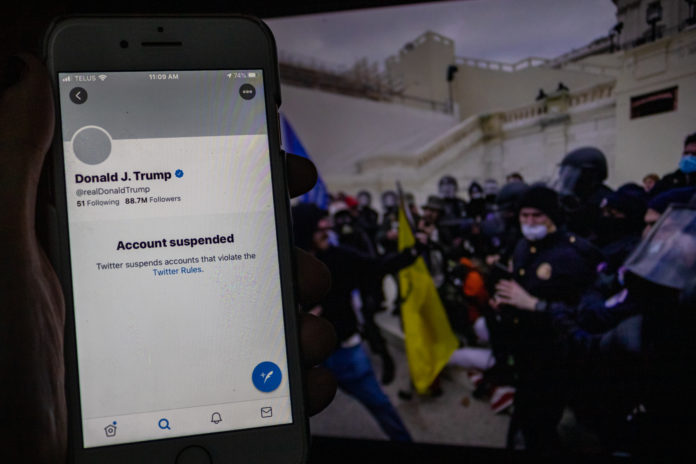
Twitter permanently suspended Donald Trump’s Twitter account on Jan. 8 due to a risk of further violence following the deadly Jan. 6 United States Capitol breach.
The former U.S. president posted a video on the day of the breach, saying he loved the mob and called them “very special,” leading to a temporary suspension on the platform before he was banned altogether. Other platforms, such as Facebook and Instagram, also suspended Trump indefinitely.
Elaina-Mae Basinger, a second-year St. Thomas University journalism student, said the ban was justified.
“The things he said incited violence and that’s not protected under freedom of speech,” she said.
Basinger, a student from Maine, said she thought it shouldn’t have taken a shocking event like the Capitol breach to prompt Trump’s removal from Twitter.
“I think he should have been banned a lot sooner,” she said.
Christina Szurlej, an associate professor in STU’s human rights department, wrote via email that Trump’s Twitter ban doesn’t violate free speech because his tweets incited violence.
Szurlej wrote that under the International Covenant of Civil and Political Rights under Article 19, free speech is protected. This does not include hate speech, propaganda or incitement to violence.
Szurlej called for clearer rules on what constitutes free speech on social media.
“Lawmakers need to set out clear restrictions in line with international human rights standards and enforce them to prevent future violence,” wrote Szurlej.
Olivia Parker, a communications professor at STU who teaches a social media course, said social media companies have the right to censor whoever doesn’t follow their guidelines. Social media platforms are privately-owned companies, she said, and can do what they want with their users on their platforms within reason.
Parker said banning users like Trump who have a large following is risky for social media companies, but that public calls for his removal were what likely led to the decision.
“These are private enterprises that want to make money, and making money means keeping people on their platforms, seeing content, absorbing ads. There is that fear, [if] you de-platform someone with millions of followers, [that] revenue [will] take a hit in some capacity. But the public outcry … sets a precedent as well,” she said.
Jamie Gillies, the coordinator of STU’s communications and public policy department, said legal reasons may have also driven Twitter to remove Trump.
Gillies said there might be legal consequences for Twitter because of their role in what happened at the Capitol.
“This was the straw that broke the camel’s back. It took this Capitol riot to finally convince Twitter to go, ‘okay, that’s too far,’” he said.
Gilles said Trump’s Twitter ban sets a precedent for the future banning of other world leaders who disobey social media regulations.
“It remains to be seen how this all plays out and what Twitter is going to do with the next political leader who does something like this,” he said.
Parker said Trump’s suspensions may also have implications for social media corporations.
“It’s going to be interesting to see if governments or larger social enterprises are going to put pressure on these social media corporations, or if the corporations will stay the course and there might just be heavier restrictions.”
